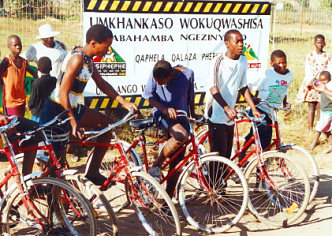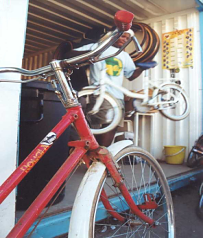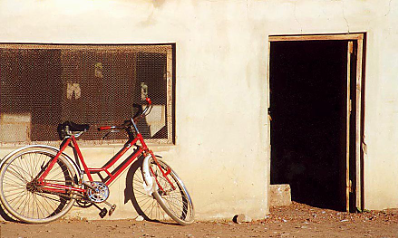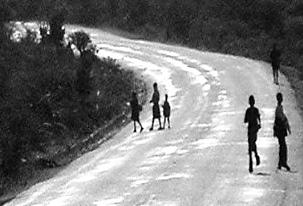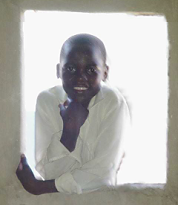|
Youth Day in Nqabeni: Afribike Nqabeni Cycle RaceThe cyclists lined up at the start line and excitement filled the air. The 40km of gravel road loomed ahead of the eager competitors. It could have been a regular mountain-bike ride except for a few things that made this race special. Looking at the field it was quite obvious what made this race different. None of the bicycles being ridden had top of the range components and most had only one gear. Instead of names like Diamondback, Kona and Trek these bicycles had no big brand names emblazoned on them. Instead they were painted red with white mudguards and had the name "Royal Mail" painted on them. There were no skintight cycling shorts, Lycra vests, cycling gloves and expensive helmets. Most noticeable of all was the fact that all the cyclists had black faces. In a sport that is almost exclusively white this race was notably black.
Youth Day 2001 saw the start of the inaugural Afribike Nqabeni Cycle Race. The Nqabeni area lies between Harding and Izingolweni and is the site of one of two unique projects of the KwaZulu-Natal and the National Department of Transport (KZNDOT and NDOT) in partnership with Afribike (http://www.afribike.com), an NGO promoting cycling in poor communities. The KZNDOT and NDOT, through a partnership with Afribike, have brought mobility to the rural areas around Nqabeni by establishing a bicycle shop in the deep rural area. The shop sells recycled bicycles at cost price to the local community. The bicycles are donated to NGOs in Europe, America and the East and shipped to South Africa where Afribike assembles and reconditions them. The majority of the bikes in Nqabeni were donated by the British Postal Service, which explains the red and white colours and the name "Royal Mail".
The humble balloon tyre bicycle or cruiser has proved to be the ideal bicycle for rural areas. Mountain bikes tend to break down too often and are difficult & expensive to maintain. An Afribike shop was established in November 2000 in two donated shipping containers tucked away in the grounds of the Mzoto General Dealer. The project was originally aimed at helping rural school children get to school. Many children walk over 8km each day to school and access to a bicycle would make it easier to attend school.
Local scholars may have been the original target market but word has spread like wildfire that cheap, good quality second hand bikes are for sale. People have travelled over 50km from Port Edward to buy a bicycle. Visiting the Nqabeni area you cannot help notice that bicycles are an everyday transport tool for the community. The Afribike shop is run by Lucky Ngobo, a young local entrepreneur, who first thought of the idea of a cycle race. Sports facilities are very limited in Nqabeni and Lucky saw the opportunity cycling offered for recreational sport as well as for transport. Lucky had never organised a race before so some things fell through the cracks, the start was an hour later than planned and there was no timekeeper. Worst of all was the fact that there were no watering points along the way. Riders desperate for a drink had to stop and push into the front of the queue at the communal water gathering points. Despite this, all fourteen contestants thoroughly enjoyed themselves and the community rallied around to cheer all the riders. Thanks to sponsorship from Afribike, Mzoto General Dealer, Go Cycle, The Ingeli Forest Challenge and the KZNDOT all contestants received prizes. Xolane (TKZ) Magubane won in a time of 1 hour 30 minutes on a bicycle most people would be afraid to ride. His black delivery bike weighed a ton, had no gears and practically no brakes. It had a loose headset and had a steel pin as a pedal on one side and a disintegrating pedal on the other. What TKZ lacked in equipment though, he gained in passion and power. When asked what gave him the edge to win he showed his muscular legs and arms built from working as a vendor of vegetables in the local area. Every day he uses his bicycle to cart vegetables around the area as he makes deliveries and fetches produce. The new mountain bike he won will help in his business. When asked about the race Lucky could not contain his excitement, "This is the start of something big" he maintains. He has already started planning for the next race in 2002. Lucky is right, not just about this race, but also about the work of the Department of Transport in promoting rural mobility through cycling. By the end of July 2001 another Afribike shop will have been established in Muden and by the end of 2002 another 1 site would be established as part of the NDOT Shova Luva (ride easy) initiative. By 2006 it is planned that at least 20 such shops would have been established in rural areas throughout the province. Xolane Magubane won the inaugural Afribike Nqabeni Cycle Race and his vending business stands as an example of how cycling can help a small business develop. That is the intention of this project and the aim of the KwaZulu-Natal Departmentís motto of "Prosperity Through Mobility". The third such race is being held since the inaugural race on 16 June 2001. The shop has now moved from Nqabeni to Izingolweni in order to provide service to a larger portion of the rural population. The 16 June 2003 will see the race take a new route starting at Izingolweni and travelling along a recently completed rural access road. For further information about the Departmentís Bicycle Project, please contact: Athol Moore
|
